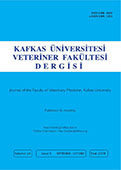
This journal is licensed under a Creative Commons Attribution-NonCommercial 4.0 International License
Kafkas Üniversitesi Veteriner Fakültesi Dergisi
2018 , Vol 24 , Issue 5
A Historical Research on the First (1927) and Second (1929) Balkan Veterinary Congress on Infectious Animal Diseases
1Department of Veterinary History and Deontology, Faculty of Veterinary Medicine, Ondokuz Mayis University, TR-55139 Samsun - TURKEY2Department of Veterinary History and Deontology, Faculty of Veterinary Medicine Harran University, TR-63200 Şanlıurfa - TURKEY
3Department of History, Faculty of Science and Letters, Ondokuz Mayis University, TR-55139 Samsun - TURKEY DOI : 10.9775/kvfd.2018.19913 The first initiative aimed at international cooperation in the prevention of epizootic diseases was launched by Professor John Gamgee, and the first international veterinary meeting was held in Hamburg, Germany on July 14-18, 1863. At that time, efforts were made to fight and ensure protection against animal diseases in Turkey, but it was not until the early years of the Republic that intensive and multifaceted efforts at a national and international level came into effect. Experienced veterinarians from various countries were invited to Turkey to carry out studies here, and Turkish veterinarians were dispatched to international congresses and meetings on animal health and improvement. At the same time, attempts were made to establish a common border health authority with neighboring countries, and efforts were made to develop health legislation. Close cooperation with the Balkan states on matters of policy following the proclamation of the Republic became obligatory, particularly with respect to animal diseases, and led to the Balkan Governments Infectious Animal Diseases Congress-I being held in Istanbul on October 4-12, 1927, followed by the Balkan Veterinary Congress II, held in Bucharest on September 21, 1929. The present study found that the senior civil servant from Turkey, Greece, Bulgaria, Romania and Yugoslavia that had attended the two congresses discussed the fight against epizootic diseases and the establishment of a veterinary organization on the borders. In conclusion, these congresses may be said to have laid the groundwork for the "Geneva International Veterinary Convention (1935)" and the bilateral veterinary conventions concluded between participatory countries that followed. Keywords : Balkan Countries, Veterinary congress, Animal diseases, Veterinary history











